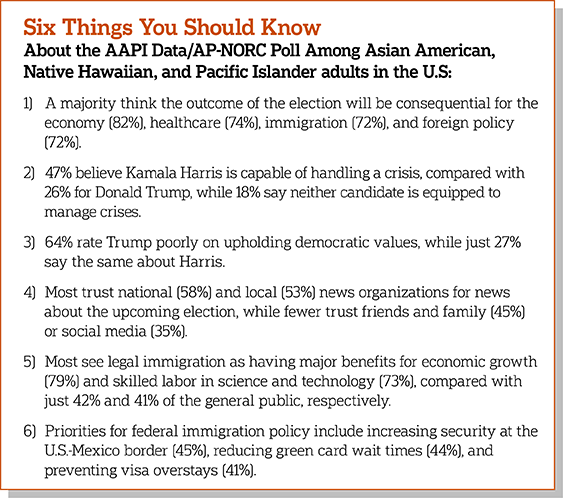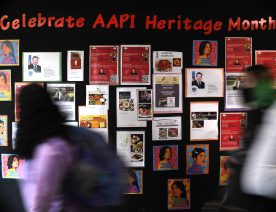
October 14, 2024
Eight in 10 AAPI adults believe the election will impact the economy, and 7 in 10 believe it will impact health care, immigration policy, and foreign policy.
With just weeks to go before the presidential election, a new AAPI Data/AP-NORC survey finds that most Asian American, Native Hawaiian, and Pacific Islander (AAPI) adults believe the outcome of the race will have important impacts on the economy (82%), health care (74%), immigration policy (72%), and foreign policy (72%).
In terms of trust to handle important issues, AAPI adults trust Vice President Kamala Harris over former President Donald Trump on abortion (65% vs. 16%), race and inequality (64% vs. 15%), and health care (59% vs. 19%). However, while Harris maintains an edge among AAPI adults, the performance gap narrows between the candidates on economic matters (41% vs. 34%), immigration (42% vs. 35%), and crime (39% vs. 33%).
AAPI adults are also more likely to think Harris rather than Trump cares about people like them (52% vs. 15%), is honest (50% vs. 15%), has the right vision for the country (49% vs. 25%), and is capable of handling a crisis (47% vs. 26%). These positive sentiments also surpass those of the general public who were asked in August 2024.
Most AAPI adults (64%) rate Trump poorly on upholding democratic values, while opinions on Harris are mixed with 45% viewing her positively, 27% negatively, and 27% saying she is neither good nor bad in this area. Thirty-nine percent believe their state government is doing a good job, 29% rate it poorly, and 32% are neutral. AAPI Democrats are more likely than AAPI Republicans to think Harris (65% vs. 12%) and their state government (49% vs. 21%) are doing a good job upholding democratic values, while AAPI Republicans are more likely than AAPI Democrats to say Trump (57% vs. 7%) and the Supreme Court (30% vs. 11%) are doing a good job.
About half (51%) of AAPI adults say the Supreme Court is doing a bad job of upholding democratic values in the United States. And they have low confidence in its ability to handle important issues. Roughly two-thirds of AAPI adults have little or no confidence in the Supreme Court’s handling of abortion (73%), gun policy (69%), presidential power and immunity (68%), or the relationship between religion and government (68%). The lack of confidence is similar in the general population.
On immigration, AAPI adults are more likely than the general population to view legal immigrants as an important asset. For example, 79% adults feel legal immigration is a major benefit for economic growth in the country, compared with 42% of the general public who were last asked in March 2024. And 73% see skilled labor in science and technology as a major benefit, well above the 41% among the broader population.
Concerns about illegal immigration are similar between AAPI adults and the general public, with similar shares citing risks to welfare programs (48% vs. 53%) and increased crime (38% vs. 40%), despite recent reports noting that immigrants tend to use benefits at lower rates and commit fewer crimes than the general population. Overall, while AAPI adults tend to view illegal immigrants as presenting higher risks compared with legal immigrants, no more than half believe either group poses major risks.
AAPI adults see increasing security at the U.S.-Mexico border (45%) and strengthening policies to prevent visa overstays (41%) as top priorities for the federal government, which is similar to the general population who were last asked in December 2021. Reducing green card wait times is also a top issue for AAPI adults, with 44% considering it a high priority. About a third of AAPI adults and the general population consider providing legal status for undocumented immigrants and deporting immigrants living in the United States illegally as high priorities.
AAPI adults express mixed feelings about the upcoming election with 37% saying fearful describes the way they feel very or extremely well and 29% saying they feel excited. One in 5 are feeling angry or satisfied. AAPI adults aged 60 and over are more likely to say excited accurately describes their feelings of the election, compared with younger AAPI adults.
Intergenerational conversations with friends and family influence the views of some AAPI adults on key issues like abortion, climate change, and LGBTQ issues. A quarter of AAPI adults say conversations with older family members have influenced their economic policy views a lot and another 34% say they’ve been influenced a little. Similar to the general population who were asked in March 2024, AAPI adults also trust national (58%) and local (53%) news organizations for information on the upcoming election, while smaller shares trust friends and family (45%) or social media (35%).

The nationwide study was conducted by The Associated Press-NORC Center for Public Affairs Research and AAPI Data from September 3 to September 9, 2024, using the Amplify AAPI Monthly survey drawing from NORC’s Amplify AAPI® Panel designed to be representative of the U.S. Asian American, Native Hawaiian, and Pacific Islander household population. Online and telephone interviews were offered in English, the Chinese dialects of Mandarin and Cantonese, Vietnamese, and Korean with 1,123 Asian American, Native Hawaiian, and Pacific Islanders aged 18 and older living in the United States. The margin of sampling error is +/- 4.7 percentage points.






